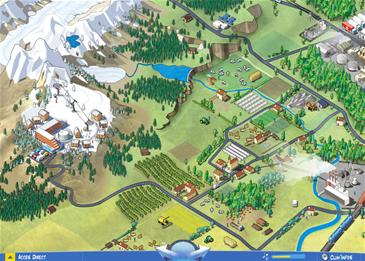Clim’ City Animates the Climate Challenge
French science center Cap Sciences takes flash-based learning to new heights in a free online game launched this week: Clim’ City (click Le Jeu to play).

At present this climate change adventure is for those of you who read French but here’s to hoping that Bordeaux-based Cap Sciences gets an English version out quick because the game is a beautifully crafted and an ingeniously programmed device for learning the contingencies and costs that lie on the road to a low-carbon energy future.
The action in Clim’ City takes place on a small map of an imaginary town animated by commuters driving here and there, and all manner of agricultural, industrial and even entertainment operations (including a ski hill) energetically going about their business. The goal is to reduce the “Clim’s” carbon footprint and thus avert the town’s demise by tweaking the way its actors produce and consume energy.
Playing such games turns information into knowledge. In my first stab at Clim’ City I have converted the town’s carbon-belching coal-fired power plant to biomass. To do so I was forced to first launch a forest management program, which really brought home the fact that collecting biomass to generate a meaningful amount of energy is, in itself, a substantial and complex task.
My powerplant conversion also came with an opportunity cost, drawing down my limited supply of government, corporate, and individual action points. In the words of the international Association of Science-Technology Centers’ International Action on Global Warming, this was a powerful reminder of the “sociopolitical constraints” facing decisionmakers today.
I’m not deep enough in to Clim’ City to know whether mine is going to make it. But if accounts in the French press and across the blogosphere are to believed there’s a good chance it won’t. This is a tough game and failure appears likely–at least early on–which imparts a healthy dose of realism.
And even if the Clim’s get cooked under my leadership, I can’t help learning.
Keep Reading
Most Popular
Large language models can do jaw-dropping things. But nobody knows exactly why.
And that's a problem. Figuring it out is one of the biggest scientific puzzles of our time and a crucial step towards controlling more powerful future models.
The problem with plug-in hybrids? Their drivers.
Plug-in hybrids are often sold as a transition to EVs, but new data from Europe shows we’re still underestimating the emissions they produce.
Google DeepMind’s new generative model makes Super Mario–like games from scratch
Genie learns how to control games by watching hours and hours of video. It could help train next-gen robots too.
How scientists traced a mysterious covid case back to six toilets
When wastewater surveillance turns into a hunt for a single infected individual, the ethics get tricky.
Stay connected
Get the latest updates from
MIT Technology Review
Discover special offers, top stories, upcoming events, and more.